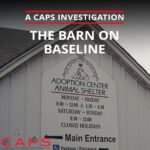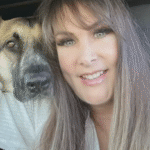The Dog House
120 Hale Rd #1
Manchester, CT 06042
(860) 648-1514
Date and time of CAPS investigation: 5/10/19; 11:59
Approximate number of puppies observed at time of investigation: 45
The store was divided into two sections, with one being for The Dog House pet shop, and the other being for Save All Dogs Rescue. When entering the store, signs point to the left for “puppies from breeders,” and to the right for the rescue. In the rescue, I saw three dogs in solid-floored pens, that appeared to be adult mixed breeds. I saw a woman (Caucasian female who identified herself as Iris, about 50 years old, 5’5″, 140 lbs., with long brown hair and thick-rimmed glasses she kept on top of her head, above her eyes) step out of a room with an “Employees Only” sign on it in the shelter. I asked her if the shelter was part of the store, and she said the dogs in the shelter were not part of the store. To clarify, I asked, “Oh, so is this like a separate business?” “Yeah. This is Save All Dogs nonprofit. And these are rescue dogs from Tennessee. Over there is puppies from private breeders, and we have more information on where we get the dogs from.” She then went to the pet shop side.
A woman (Caucasian female, about 30 years old, 5’4″, 165 lbs., with long bleached hair partially died blue, green, and red, thick-rimmed glasses, and cheek piercings) stepped out of the same doorway as Iris, and I asked her if the shelter was separate from the store, and she said, So, we’re a nonprofit organization. We get all of our dogs from Tennessee kill shelters. Strays found in Tennessee. Sometimes we get local surrenders, but we focus on the dogs down south.”
When I asked for more information about where the rescue dogs come from, she added, “A lot of them are sent to kill shelters, which we work with rescues down there to pull them from kill shelters, get them healthy, fix them, get them medications, surgeries, anything like that that they need. Rehabilitating, training, if they can train them. Stuff like that. And then they come up to Connecticut.” I then said, “Got it. You’re completely unaffiliated….” while motioning to the pet store. She replied, “Yeah.” I asked, “You’re just in the same building?” She responded, “Yeah. We stay here. They’re allowed to stay here. Sometimes they give us donations and support us if we need support. But other times, we are our separate company here. Not company, organization.” She then handed me a card for the shelter that noted the shelter is a 501c3 nonprofit.
I stepped out of the shelter and within two seconds was standing in The Dog House, where puppies were in various enclosures for sale. Most enclosures had wire floorings with solid walls, lined up in a bank on a wall, while two enclosures near them were rooms with solid floorings. Puppies had cage cards that showed the breeders’ towns and states but no other breeder information. Each card had a place for “USDA #” that was followed by a seven or eight digit number, and not a USDA number. Iris explained that the number shows employees where to look up information on the puppies’ breeders.
On the wall opposite the puppies, and about 15’ from the clerk counter, was a pile of Certificates of Origins and a folder of USDA inspection reports. They were placed on and next to an empty dog cage at about knee height, and not clearly visible to customers walking through the store looking at puppies. Signs noting consumer rights and offering information about puppies (but no information about breeders or USDA inspection reports) was on a wall near the doorway at head height, evident if customers turned around 180 degrees after entering the store.
I told Iris I thought The Dog House and Save All Dogs Rescue was the same thing, and she responded, “No. It’s like Walmart and Dunkin’ Donuts in the same facility, but it’s two different businesses.” I asked her about the store’s breeders, asking, “Do you know like, do they have dogs in cages, or do they raise them in the homes, or do they have hundreds of dogs, or a few dogs?” and she said, ‘Well, they’re a few dogs,“ and then said she should show me information on Wilma Westhoff as an example. She showed me a binder with photographs of Westhoffs’ Elk Creek Kennel in Chanute, Kansas, which showed aerial photographs of the kennel (with elevated wire cages and concrete dog runs evident), a photograph from ground level of dog runs, and photographs of the Westhoffs’ property, including horses and the Westhoffs sitting with their grandchildren.
I asked if the dogs run in the yards shows in the photos, and Iris answered, “It’s all for the dogs.” She added, “Like I say, she only has small property. She doesn’t need a whole lot. It’s more for her babies that are inside her home, you know. She has to treat them like it’s her dogs.” I asked, “Are the puppies raised in the home, or are they raised in like…” and before I could finish, she said, “In the home.” I asked again, “They’re raised in the home?” She said, “In the home. Yeah. And they have their own kennels by the time they move out here. Because they have to give that one-week window before they come out here because they’re used to that family. And we don’t want that. Cause then they’re gonna’ be lying there crying all the time.”
I asked Iris for information about the store’s breeders in general, and asked, “When they breed them, do they skip breeding cycles or retire them at a certain age?” She answered, “They skip.” To clarify, I asked, “All the breeders skip cycles? She responded, “Yes.” I then asked, “And do you know how long the breeders breed them for?” She told me, “Usually they can only get one or two litters out of them.” She added, “I haven’t seen more than two litters within the year,” I then asked, “Oh really, they breed the dog once or twice and then that’s it? They don’t breed her any more at all?” She answered, “A lot of times they use it as family or they adopt them at shelters.”
Iris said that puppies are kept at the pet store and have their prices reduced as they get older, but if they begin to reach about five months of age, the puppies’ prices will be reduced and puppies will be given to The Dog House, but that most of the dogs at the shelter are rescues from Tennessee. She said there’s a long application process with the shelter, but told me that raising a puppy is more work than buying a dog from a rescue. However, she then warned me that the history of dogs at shelters is unknown, and that puppies from the store won’t have bad behavior like rescues may have, and said that the puppies from the store “learn from you.”
Evidence of false statements and misrepresentations of breeders by store:
Beth and Iris’s claims that The Dog House and All Dogs Rescue are unaffiliated is false. Both facilities are owned by the Carty family – parents Richard and Prudence and son Chris. Dick Carty was a franchise owner for Docktor Pet Center, a chain of 300 stores. Through CAPS’ efforts, Docktor Pet Center went into Chapter 7 bankruptcy in February 1993. The Cartys own The Puppy Place in Springfield, MA, which CAPS has investigated. The State of Massachusetts shut down another store they owned, The Dog House II in North Attleboro, due to numerous violations, including an outbreak of parvovirus.
Iris’s claim that the Westhoff’s don’t have dogs in cages is false, as cages are visible on their property even from a photograph she showed me of the property. USDA photos show cages (see violations below). Her claim that other breeders don’t have cages is also false, as I saw dogs in cages at the store’s breeder Keith Simler, on 4/20/15 and saw dozens of dogs in elevated wire cages. USDA photos also showed cages (see violations below).
Iris’s claims that breeders skip breeding cycles and that they only breed dogs once or twice are false. Of the thousands of commercial dog kennels CAPS has investigated, only one purposefully skipped breeding cycles on some of their smallest dogs, and none breed their dogs only once or twice.
Iris’s claims that the store’s breeders keep their spent breeders as pets or adopt them at shelters is false. Some breeders will have rescues pick up their dogs, but CAPS has found no breeder adopts out their dogs from shelters. While some breeders will keep one or more dogs that are spent breeders as pets, the practice is rare, as otherwise each breeder would have dozens or hundreds of dogs as pets.
Breeder info:
The following were obtained from Certificates of Origin (not all were documented):
Breeder / Broker
- Jean Bos, 4951 Grant Ave, Maurice, IA 51036 / Fulton Ent., 603 S Broadway, Alden, MN 56009
- Elias Mast, 13484 202nd St, Bloomfield, IA 52537 / Fulton Ent.
- Sue Shold, 10491 490th St, Albert City, IA 50510 / Fulton Ent.
- Brenda Walter, 28062 Love Trail, Green Castle, MO 63544 / Fulton Ent.
- Marlin Dibbet, 4129 Hickory Ave, Sioux Center, IA 51250 / Fulton Ent.
- Keith (and Wanda) Simler, 16995 Simler Trl, Kirksville, MO 63501 / Fulton Ent. The facility had more than 140 dogs during the CAPS investigation of this facility in 2015. Many of the dogs ran in circles from being perpetually confinsed. Some dogs did not have a view through the windows of an indoor enclosure, which is a violation of Missouri regulations. The Simlers had numerous USDA violations during their 2013 inspection: brown matter on teeth and receding gums; severe matting; entangled fecal matter dangling from rear end and back legs; one cloudy eye and one eye with web-like cover; deeeased newborn puppy with three adult dogs; old dishes with stale food and old bedding on top of enclosures; ammonia odor; AC and battery charges on top of sagging enclosure containing dogs.
The following were obtained from USDA inspection reports (not all reports were documented):
- Darrell Wagler, 10271 E 475 N, Loogootee, IN 47553
- Rick Klinkhammer, 46-A-0331
- Fred Joseph Knepp, 10010 E 550 N, Loogootee, IN 47563, 32-A-0411
- Lori and Loren Koolman,2703 Garfield Ave, Doon, IA 51235, 42-A-0609
- Joanna and Marvin Newswanger, 19590 Elm Ave, Alta Vista, IA 50603, 42-A-1390
Newswangers’ 2014 USDA violations included feet and legs passing through flooring and hair and accumulation of hair, wood shavings and dust. - Duane Otto, 351 E Cr 100N, Arthur, IL 61911 (USDA license # was left blank)
The following was obtained from a folder with pictures of Westhoff’s kennel, and a manila folder containing information about the kennel:
Jim & Wilma Westhoff, Elk Creek Kennel, 13450 Gray Rd, Chanute, KS 66720
Westhoff’s 2011 USDA violations included two serious veterinary care violations: a dog with an infected eye that had cream film over eyeball, crusty substance around eye, eyeball an abnormal shape, and very red eye, and a mother dog, who recently lost puppies and was suffering from poor body condition, a possible infection. Other violations included chewed or worn doors and frames and dirty, grime, grease and cobwebs in shelters.




